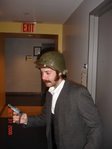For Allen Ginsberg
Except for epics, poems usually don't get movies of their own. The poets are the ones who get the films, though rarely. Eliot and Keats were famous enough to have them. The reasons are simple, most poems do not have stories and are not long enough to sustain a film. Unfortunately, people also do not give the same attention to poetry as they do to prose as well, which means there is less of an in-built audience for an adaptation.
Ginsberg's Howl is one of the few poems that could be turned into a movie, or at least be used as the centerpiece of one. The poem is long enough and it has a story, not just in its creation, but also in its publication and the obscenity trial that ensued. It has been read by millions of people (including the lady who sold me my movie ticket) and many know parts of it by heart. It helped usher in the social revolutions of the 1960s, and changed the nature of American poetry forever.
Of course, a straight adaption would be difficult, if not impossible. The poem contains many surreal images and symbols. It does not have a conventional narrative with any identifiable hero (other than Neal Cassady). These are its great strengths, along with an openness and frank discussion of once taboo topics of sex and drugs. Yet they prevent a conventional movie adaptation from happening. Besides, trying to literally present the poem in unimaginative ways would betray the revolutionary nature of Howl itself.
So it was up to writers and directors Rob Epstein and Jeffrey Friedman to craft an unconventional movie that mostly stays true to the spirit of the poem and helps educate viewers about Ginsberg and the piece. It combines James Franco as Ginsberg giving an interview where he talks about Howl, scenes of him presenting it at its first reading, the court case over it in San Francisco, and animated sequences that give an artistic interpretation of the poem. Despite these different strands, the directors weave them together well, though the animated portions are not as well integrated. Their tone and color seems out of place, as such sequences often do when used in movies, and the images suffer from being too literal and cliche at times.
The performances were good, though many of the actors did not have time to shine. James Franco plays a young Allen Ginsberg perfectly. He has the poet's vocal and physical mannerisms, and captures his cadences when reciting Howl for his audience. Ginsberg's sensitive and intellectual nature is reflected in Franco's portrayal along with his shyness and physical longing for companionship and affection. John Hamm is confident and bold as defense attorney Jake Ehrlich and his opponent David Strathairn is equally compelling in his performance as the prosecutor. The rest of the Beats who feature in the movie get shortchanged, with not enough opportunities to portray their characters and show their charisma and influence on Ginsberg.
What the movie needed most was to explore the development of the poem, which was only hinted at. James Franco's Allen Ginsberg talks about his fears of his father reading the poem, without telling the audience that he did send it to his father Louis (also a poet) and it was his way of coming out. His father only commented on the blue language. He also sent it to William Carlos Williams, whose role as a mentor of sorts is missing. The movie also fails to spend much time on his relationship with his mother, a critical influence on his life and poetry. There is mention of it, but the true nature of what happened is never revealed.
The ending of the film discusses the fates of those involved with Howl and its writing, with Ginsberg's "Father Death Blues," played over it, and is highly moving. The face of the real Allen Ginsberg appears as an old man, along with the fact he died in 1997. I think this is one of the most important sections in the movie, and most reviews of Howl will probably miss out on its significance. It helps remind the young aspiring writers watching it that the Beat Generation is pretty much gone, its leaders dead, some for a long time. It is up to us to now create literary movements of our own, giving eyeball kicks to the culture in hopes of jump starting it.
Overall, I give the movie a B+ grade. The performances redeem the animated parts, though more on the other Beats could have been included. The genesis of the poem needed more explanation, to show how Ginsberg took the exploits of his friends and turned them into surreal spiritual situations. The film gets points for dealing with Ginsberg's homosexuality and discussing it, showing his relationship to Peter Orlovsky as well. The discussion about censorship and what counts as literature is valuable to listen to and makes one think about their own positions on these issues. The movie is best for those who are just discovering Ginsberg and the Beats and want to learn more about them. Those who are long term fans of the work will probably get less out of the film.


3 comments:
and you're certain that the notion of a contemporary poetic movement is not also dead?
If it is, I'll be a movement of one then
Bill Williams would be proud.
Post a Comment